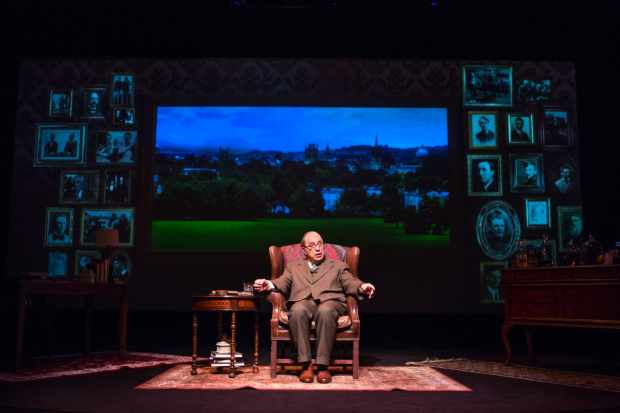C.S. Lewis Onstage: The Most Reluctant Convert
Max McLean and his Fellowship for Performing Arts maps the ”Narnia” creator’s route to God.

(© Jeremy Daniel)
From 1942 to 1944, C.S. Lewis delivered a series of BBC radio talks making what is now known as his Case for Christianity. The talks were eventually adapted and set to print in the theological touchstone Mere Christianity (at which point his famed Chronicles of Narnia series was already off and running), but the majority of Lewis' audio broadcasts have been lost to time.
Though this creates an unfortunate hole in the historical archives, it's one that makes playwright and actor Max McLean's work so exciting and valuable to Lewis' modern-day disciples. McLean goes mercifully beyond impersonation with his solo play C.S. Lewis Onstage: The Most Reluctant Convert (now running at the Acorn Theatre at Theatre Row), adding humor and conviction to the words you may or may not already associate with the influential author and theologian.
As McLean's uncannily spot-on performance suggests, The Most Reluctant Convert (codirected by McLean and Ken Denison) is not his first rodeo with C.S. Lewis, having also performed his own adaptations of Lewis' Screwtape Letters and The Great Divorce. As the founder and artistic director of Fellowship for Performing Arts — a company that approaches theater from a Christian vantage point — it's understandable that McLean keeps returning to Lewis to cull more from his deep well of academic religious contemplation.
The Most Reluctant Convert primarily lives in this intellectual space, serving as more of an exercise in philosophical reasoning than a theatrical event. McLean does do justice to Lewis' highly theatrical manner, donning his affected British accent as a pipe dangles from his mouth (his pronunciation of the word "pain" is, ironically, most delightful). But the play essentially amounts to a 75-minute presentation on Lewis' step-by-step journey from atheism to Christianity, with a few musical transitions between sections for emphasis (original compositions by John Gromada).
McLean wanders around a finely furnished European living room (efficiently and pleasingly designed by Kelly James Tighe), moving from chair to desk to liquor table as he recounts his religious journey from his days as a staunch atheist all the way to his Christian epiphany. Portraits of his literary influences appear behind him like Lewis' personal hall of fame (projections by Rocco DiSanti). He discusses the life-changing impact of George MacDonald's fantasy novel Phantastes as well as his long walks with Lord of the Rings author J.R.R. Tolkien. These, among other literary and philosophical greats, were the voices that guided Lewis' change of heart, mind, and spirit — a "reluctant" transition for a man who claims to have preferred believing himself the master of his own ship.
In these recollections, McLean is not only faithful to the author's voice, but he also achieves Lewis' standards for meticulous detail. The explanation of his religious progression at times feels labored — like an academic paper desperately bracing itself for someone with a sharp needle to start poking at it. But better that than a lazy account of what went on in Lewis' consciousness during this time of transition, which has fascinated so many of his fellow believers for decades.
Lewis himself certainly would not have tolerated such laziness, so neither should we. It may not make for an evening of deep emotional catharsis, but your powers of introspection, logical reasoning, and metaphysical theorizing will get a good workout. And that's useful no matter which side of the religious debate you find yourself on.








